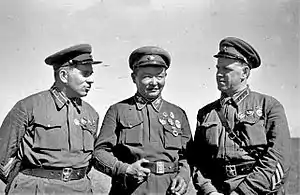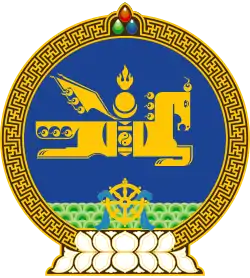Mongolian Armed Forces
The Mongolian Armed Forces (Mongolian: Монгол улсын зэвсэгт хүчин, Mongol ulsyn zevsegt hüchin) is the collective name for the Mongolian military and the joint forces that comprise it. It is tasked with protecting the independence, sovereignty, and territorial integrity of the Mongolian state.[3] Defined as the peacetime configuration, its current structure consists of two branches: ground forces and air force. In case of war situation Border Troops, Internal Troops and National Emergency Management Agency will be reorganized into the armed forces structure.[4] The official holiday of their military is Men's and Soldiers' Day (Эр цэргийн баяр, Эрчүүдийн баяр) on March 18, the equivalent of Defender of the Fatherland Day in Russia.
| Mongolian Armed Forces | |
|---|---|
| Монгол Улсын Зэвсэгт Хүчин | |
 Mongolian Armed Forces Emblem | |
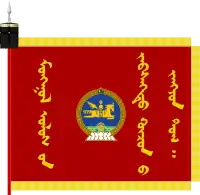 General banner of the Mongolian Armed forces | |
| Founded | 1912 |
| Current form | 1990 |
| Service branches | |
| Headquarters | Ulaanbaatar, Mongolia |
| Leadership | |
| Commander-in-Chief | President Khaltmaagiin Battulga |
| Minister for Defense | Nyamaagiin Enkhbold |
| Chief of General Staff | Major General Dovchinsürengiin Ganzorig[1] |
| Manpower | |
| Military age | 18 |
| Conscription | yes |
| Available for military service | 1,298,546 males, age 16–49 (2019[2]), 1,191,192 females, age 16–49 (2019[2]) |
| Fit for military service | 996,199 males, age 16–49 (2019[2]), 996,628 females, age 16–49 (2019[2]) |
| Reaching military age annually | 56,829 males (2019[2]), 49,648 females (2019[2]) |
| Active personnel | 150,000 (2021) |
| Reserve personnel | 200,000 (2021) |
| Expenditures | |
| Budget | $210 million (2019) |
| Percent of GDP | 1.5% |
| Industry | |
| Foreign suppliers | |
| Related articles | |
| History | Army of the Mongol Empire Mongolian People's Army |
| Ranks | Mongolian military ranks |
History
Mongol Empire and post-imperial
As a unified state, Mongolia traces its origins to the Mongol Empire created by Genghis Khan in the 13th century. Genghis Khan unified the various tribes on the Mongol steppe, and his descendants eventually conquered almost the entirety of Asia, the Middle East, and parts of Eastern Europe. The military of the Mongol Empire is regarded to be the first modern military system.
The Mongol Army was organized into decimal units of tens, hundreds, thousands, and ten thousands. A notable feature of the army is that it was composed entirely of cavalry units, giving it the advantage of maneuverability. Siege weaponry was adapted from other cultures, with foreign experts integrated into the command structure.
The Mongols rarely used naval power, with a few exceptions. In the 1260s and 1270s they used seapower while conquering the Song dynasty of China, though they were unable to mount successful seaborne campaigns against Japan due to storms and rough battles. Around the Eastern Mediterranean, their campaigns were almost exclusively land-based, with the seas being controlled by the Crusader and Mamluk forces.
With the disintegration of the Mongol Empire in the late 13th century, the Mongol Army as a unified unit also crumbled. The Mongols retreated back to their homeland after the fall of the Mongol Yuan Dynasty, and once again delved into civil war. Although the Mongols became united once again during the reign of Queen Mandukhai and Batmongkhe Dayan Khan, in the 17th century they were annexed into the Qing Dynasty.
Period under Qing Rule
Once Mongolia was under the Qing, the Mongol Armies were used to defeat the Ming dynasty, helping to consolidate Manchu Rule. Mongols proved a useful ally in the war, lending their expertise as cavalry archers. During most of the Qing Dynasty time, the Mongols gave military assistance to the Manchus.[5]
With the creation of the Eight Banners, Banner Armies were broadly divided along ethnic lines, namely Manchu and Mongol.
Bogd Khanate (1911–1919)
In 1911, Outer Mongolia declared independence as the Bogd Khaanate under the Bogd Khan. This initial independence did not last, with Mongolia being occupied successively by the Chinese Beiyang Government, and Baron Ungern's White Russian forces. The modern precursor to the Mongolian Armed Forces was placed, with men's conscription and a permanent military structure starting in 1912.[6]
Mongolian People's Republic
With Independence lost again to foreign forces, the newly created Mongolian People's Revolutionary Party created a native communist army in 1920 under the leadership of Damdin Sükhbaatar in order to fight against Russian troops from the White movement and Chinese forces. The MPRP was aided by the Red Army, which helped to secure the Mongolian People's Republic and remained in its territory until at least 1925. However, during the 1932 armed uprising in Mongolia and the initial Japanese border probes beginning in the mid-1930s, Soviet Red Army troops in Mongolia amounted to little more than instructors for the native army and as guards for diplomatic and trading installations.
Battles of Khalkhin Gol
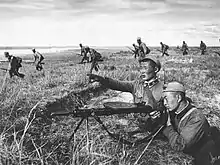
The Battles of Khalkhin Gol began on 11 May 1939. A Mongolian cavalry unit of some 70–90 men had entered the disputed area in search of grazing for their horses. On that day, Manchukuoan cavalry attacked the Mongolians and drove them back across the Khalkhin Gol. On 13 May, the Mongolian force returned in greater numbers and the Manchukoans were unable to dislodge them.
On 14 May, Lt. Col. Yaozo Azuma led the reconnaissance regiment of 23rd Infantry Division, supported by the 64th Infantry Regiment of the same division, under Colonel Takemitsu Yamagata, into the territory and the Mongolians withdrew. Soviet and Mongolian troops returned to the disputed region, however, and Azuma's force again moved to evict them. This time things turned out differently, as the Soviet–Mongolian forces surrounded Azuma's force on 28 May and destroyed it.[7] The Azuma force suffered eight officers and 97 men killed and one officer and 33 men wounded, for 63% total casualties. The commander of the Soviet forces and the Far East Front was Comandarm Grigory Shtern from May 1938.[8]
Both sides began building up their forces in the area: soon Japan had 30,000 men in the theater. The Soviets dispatched a new Corps commander, Comcor Georgy Zhukov, who arrived on 5 June and brought more motorized and armored forces (I Army Group) to the combat zone.[9] Accompanying Zhukov was Comcor Yakov Smushkevich with his aviation unit. J. Lkhagvasuren, Corps Commissar of the Mongolian People's Revolutionary Army, was appointed Zhukov's deputy.
The Battles of Khalkhin Gol ended on 16 September 1939.
World War II and immediate aftermath

In the beginning stage of World War II, the Mongolian People's Army was involved in the Battle of Khalkhin Gol, when Japanese forces, together with the puppet state of Manchukuo, attempted to invade Mongolia from the Khalkha River. Soviet forces under the command of Georgy Zhukov, together with Mongolian forces, defeated the Japanese Sixth army and effectively ended the Soviet–Japanese Border Wars.
In 1945, Mongolian forces participated in the Soviet invasion of Manchuria under the command of the Red Army, among the last engagements of World War II. A Soviet–Mongolian Cavalry mechanized group under Issa Pliyev took part as part of the Soviet Transbaikal Front.[10] Mongolian troops numbered four cavalry divisions and three other regiments. During 1946–1948, the Mongolian People's Army successfully repelled attacks from the Kuomintang's Hui regiment and their Kazakh allies in the border between Mongolia and Xinjiang. The attacks were propagated by the Ili Rebellion, a Soviet-backed revolt by the Second East Turkestan Republic against the Kuomintang Government of the Republic of China. This little-known border dispute between Mongolia and the Republic of China became known as the Pei-ta-shan Incident.
These engagements would be the last active battles the Mongolian Army would see, until after the democratic revolution.
After the Democratic Revolution

Mongolia underwent a democratic revolution in 1990, ending the communist one-party state that had existed since the early 1920s. In 2002, a law was passed that enabled Mongolian Army and police forces to conduct UN-backed and other international peacekeeping missions abroad.[6] In August 2003, Mongolia contributed troops to the Iraq War as part of the Multi-National Force – Iraq. Mongolian troops, numbering 180 at its peak, were under Multinational Division Central-South and were tasked with guarding the main Polish base, Camp Echo. Prior to that posting, they had been protecting a logistics base dubbed Camp Charlie in Hillah.[11]
Then-Chairman of the Joint Chiefs of Staff, General Richard Myers, visited Ulan Baator on 13 January 2004 and expressed his appreciation for the deployment of a 173-strong contingent to Iraq. He then inspected the 150th Peacekeeping Battalion, which was planned to send a fresh force to replace the first contingent later in January 2004.[12] All troops were withdrawn on September 25, 2008.[13]
In June 2005, Batzorigiyn Erdenebat, the Vice Minister of National Defence, told Jane's Defence Weekly that the deployment of forces in Mongolia was changing away from its Cold War, southern-orientated against China posture. "Under Mongolia's regional development concept the country has been divided into four regions, each incorporating several provinces. The largest capital city in each region will become the regional centre and we will establish regional military headquarters in each of those cities," he said. However, at the time, implementation had been delayed.[14]
In 2009, Mongolia sent 114 troops as part of the International Security Assistance Force to Afghanistan. The troops were sent, backing the U.S. surge in troop numbers. Mongolian forces in Afghanistan mostly assist NATO/International Security Assistance Force personnel in training on the former Warsaw Pact weapons that comprise the bulk of the military equipment available to the Afghan National Army.
Peacekeeping missions
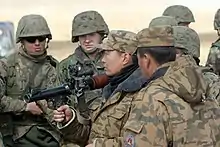

Mongolian armed forces have been performing peacekeeping missions in South Sudan, Chad, Georgia, Ethiopia, Eritrea, Congo, Western Sahara, Sudan (Darfur), Iraq, Afghanistan, and in Sierra Leone under the mandate of the United Nations Mission in Liberia. In 2005/2006, Mongolian troops also served as part of the Belgian KFOR contingent in Kosovo. From 2009 to 2010 Mongolian Armed Forces deployed its largest peace keeping mission to Chad and completed the mission successfully. In 2011, the government decided to deploy its first fully self-sustained forces to the United Nations Mission UNMISS in South Sudan. Since then Mongolian Infantry battalion has been conducting the PKO tasks in Unity State of Republic of South Sudan. In addition, Mongolian Staff officers deployed at the Force Headquarter and Sector Headquarters of the UNMISS mission. First general officer deployed in this mission as Brigade Commander in 2014.
On November 17, 2009, Deputy Assistant Secretary of Defense for Partnership Strategy and Stability Operations, James Schear had lunch with Col. Ontsgoibayar and selected troops from the 150th Peacekeeping Battalion under his command, bound for Chad on November 20, 2009.[15] Afterwards Schear visited the Five Hills Regional Training Center, which hosts numerous combined multinational training opportunities for peacekeepers.
Other peacekeeping battalions in the Mongolian forces may include the 084th Special Task Battalion, and the 330th and 350th Special Task Battalion.[16]
Historical Mongolian naval forces
Historically, the Mongolian Navy was one of the largest in the world, during the time of Kublai Khan.[17] However, most of the fleet sank during the Mongol invasions of Japan.[18] The Mongolian Navy was recreated in the 1930s, while under Soviet rule, using it to transport oil.[19] By 1990, the Mongolian Navy consisted of a single vessel, the Sukhbaatar III, which was stationed on Lake Khövsgöl, the nation’s largest body of water by volume. The Navy was made up of 7 men, which meant it was the smallest navy in the world at the time.[19] In 1997, the navy was privatized, and offered tours on the lake to cover expenses.[20] [17] Currently, Mongolia does not have an official Navy, but they have small border patrols on Buir Lake, patrolling the border between Mongolia and China in the lake.[21]
Policy
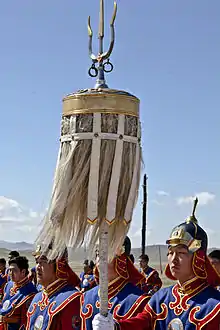
Mongolia has a unique military policy due to its geopolitical position and economic situation. Being between two of the world's largest nations, Mongolian armed forces have a limited capability to protect its independence against foreign invasions; the country's national security therefore depends strongly on diplomacy, a notable part of which is the third neighbor policy. The country's military ideal is to create and maintain a small but efficient and professional armed forces.[22]
Organization
Higher leadership
The military order of precedence is as follows:[23]
- President of Mongolia (Commander-in-Chief)
- Minister of Defense
- Deputy Ministers of Defense
- Chief of the General Staff of the Armed Forces
- Deputy Chiefs of the General Staff of the Armed Forces
- Service branch commanders
The General Staff (Mongolian: Зэвсэгт хүчний жанжин штаб) is the highest decision making body in the armed forces outside of the government controlled defense ministry. It provides the armed forces with integrated military management and participates in the development of defense policy and the planning and organizing of the military. It also informs and consults with the National Security Council on defense matters.[24][25][26] It is led by the Chief of the General Staff who is the professional head of the military, being the equivalent to the American Chairman of the Joint Chiefs of Staff and the Russian Chief of the General Staff.
The following are departments that make up the general staff main body:
- Policy and Strategic Planning Department
- Operations Management Department
- Troops and Supply Department
- Military Medical Service[27]
- Military Intelligence Directorate (Subordinated to the Office of the Prime Minister of Mongolia[28])
- General Inspectorate
These departments are led by directors (in the lattermost case a Chief Inspector General) who supervise and manage these departments. These positions are collectively part of the General Staff leadership.[29]
Ground Force
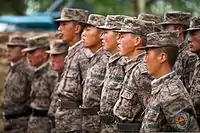

The Ground Forces possess over 470 tanks, 650 Infantry Fighting Vehicles and armored personnel carriers, 500 mobile anti-aircraft weapons, more than 700 artillery and mortar and other military equipment. Most of them are old Soviet Union models designed between the late 1950s to early 1980s. There are a smaller number of newer models designed in post-Soviet Russia.
Air Force
On May 25, 1925 a Junkers F.13 entered service as the first aircraft in Mongolian civil and military aviation.[30] By 1935 Soviet aircraft were based in the country. In May 1937 the air force was renamed the Mongolian People's Republic Air Corps. During 1939–1945 the Soviets delivered Polikarpov I-15s, Polikarpov I-16s, Yak-9s and Ilyushin Il-2s. By 1966 the first SA-2 SAM units entered service, and the air force was renamed the Air Force of the Mongolian People's Republic. The MiG-15, UTI and MiG-17 the first combat jet aircraft in the Mongolian inventory, entered service in 1970 and by the mid-1970s was joined by MiG-21s, Mi-8s and Ka-26s.
After the end of the Cold War and the advent of the Democratic Revolution, the air force was effectively grounded due to a lack of fuel and spare parts. However, the government has been trying to revive the air force since 2001. The country has the goal of developing a full air force in the future.[22]
In 2011, the Ministry of Defense announced that they would buy MiG-29s from Russia by the end of the year, but this did not materialize.[31][32] In October 2012 the Ministry of Defense returned a loaned Airbus A310-300 to MIAT Mongolian Airlines.[33] From 2007 to 2011 the active fleet of MiG-21s was reduced.[34][35][36] In 2013 the Air Force examined the possibility of buying three C-130J transport airplanes, manufactured by Lockheed Martin.[37] Left without Russian aid, the Mongolian air force inventory gradually reduced to a few Antonov An-24/26 tactical airlifters and a dozen airworthy Mi-24 and Mi-8 helicopters.[32]
On November 26, 2019 Russia donated two MiG-29 fighter aircraft to Mongolia, which then became the only combat-capable fighter jets in its air force.[38][32]
References
- http://www.mod.gov.mn/index.php?com=news&id=1688
- CIA World Factbook (2012). "Mongolia". Retrieved 12 March 2012.
- "Зэвсэгт хүчний жанжин штаб". gsmaf.gov.mn.
- "МОНГОЛ УЛСЫН ХУУЛЬ – ЗЭВСЭГТ ХҮЧНИЙ ТУХАЙ (Шинэчилсэн найруулга)". legalinfo.mn. Retrieved 24 March 2019.
- Bernard Hung-Kay Luk, Amir Harrak-Contacts between cultures, Volume 4, p. 25
- Зэвсэгт хүчний жанжин штаб. "ЗХ-ний түүх". Retrieved 12 March 2012.
- Drea, Edward J. "Leavenworth Papers No. 2 Nomonhan: Japanese Soviet Tactical Combat, 1939 – BIG MAPS – Map 3" – Retrieved: 13 May 2007. Archived November 13, 2011, at the Wayback Machine
- http://www.peoples.ru/military/general/shtern/. Retrieved 24 December 2014. Missing or empty
|title=(help) - Baabar (1999), p. 386–387.
- https://web.archive.org/web/1/http://www.niehorster.org/012_ussr/45-08-08/army_cav-mech.html
- Mongolian Contingent in Iraq. An Afghan Education from the Ground Up Archived 2015-09-04 at the Wayback Machine. Coalition Bulletin. December–January 2007. centcom.mil
- 'US defence chief visits Mongolia,' Jane's Defence Weekly, 21 January 2004, 16.
- A Salute to Our Gallant Allies in Iraq. talkingproud.us. February 27, 2005, updated January 28, 2007
- Interview, Batzorigiyn Erdenebat, Vice Minister of National Defence, Jane's Defence Weekly, 29 June 2005, p. 34
- "Cable 09ULAANBAATAR332 (unredacted)". cabledrum. Archived from the original on 29 October 2013. Retrieved 24 December 2014.
- news - БХ-ын сайд тайлангаа тавив. News.mn. Retrieved on 2013-1-25. Archived July 1, 2015, at the Wayback Machine
- Farrier, John (5 July 2010). "Landlocked Navies of the World". Neatorama. Retrieved 14 April 2018.
- "Being landlocked hasn't stopped these countries from having a navy". The A.V. Club. Retrieved April 9, 2018.
- "Mongolia's Strange and Unnecessary (and Really Small) Navy". Dan Lewis. Retrieved 2017-03-08.
- "The Mongolian Navy – all at sea". Litmus Films. Retrieved April 9, 2018.
- bpo.gov.mn. "БУЙР НУУРЫН УСАН ХИЛ ХАМГААЛАЛТЫН НЭЭЛТ БОЛЛОО". bpo.gov.mn. Retrieved 2021-01-16.
- "Б.БАЯРМАГНАЙ: ЗЭВСЭГТ ХҮЧНИЙГ ГЭРЭЛТЭЙ, ГЭГЭЭТЭЙ ИРЭЭДҮЙ ХҮЛЭЭЖ БАЙНА". 2011-11-07. Retrieved 2012-03-13.
- "Archived copy". Archived from the original on 2019-02-23. Retrieved 2019-06-18.CS1 maint: archived copy as title (link)
- "..:: www.Legalinfo.mn – Хуулийн нэгдсэн портал сайт ::." www.legalinfo.mn.
- "Зэвсэгт хүчний жанжин штаб – Танилцуулга – Монгол улсын засгийн газар – Government of mongolia". Zasag.mn. 2019-07-08. Archived from the original on 2019-06-18. Retrieved 2019-07-12.
- https://www.globalsecurity.org/military/world/mongolia/maf.htm
- https://military-medicine.com/almanac/87-mongolia-republic-of.html
- "Mongolia - Government and society". Encyclopedia Britannica.
- Sanders, Alan J. K. (August 25, 2017). Historical Dictionary of Mongolia. Rowman & Littlefield. ISBN 9781538102275 – via Google Books.
- Scramble.nl (2001). "Mongolian Air Force". Archived from the original on February 7, 2012. Retrieved 12 March 2012.
- news.mn (2011-07-15). "Монголын нисэх хүчин МиГ-29 сөнөөгчөөр зэвсэглэнэ". Archived from the original on July 17, 2011. Retrieved 12 March 2012.
- https://news.mn/en/789888/
- mod.gov – АЭРОБУС ОНГОЦЫГ БУЦААЖ ӨГНӨ. mod.gov.mn. Retrieved on 2013-4-08. Archived October 4, 2013, at the Wayback Machine
- Archived April 20, 2013, at the Wayback Machine
- "Archived copy". Archived from the original on 2013-08-20. Retrieved 2013-02-13.CS1 maint: archived copy as title (link)
- shuud.mn : Монголын цэргийнхэн Хойд Солонгосыг “зэвсэглэсэн үү” Archived 2013-04-10 at the Wayback Machine. shuud.mn. Retrieved on 2013-04-16.
- eurasianet - Mongolia Planning To Buy U.S. Military Airplanes. eurasianet.org. Retrieved on 2013-4-08.
- https://www.janes.com/article/92899/russia-donates-two-mig-29ub-fighter-aircraft-to-mongolia
 This article incorporates public domain material from the CIA World Factbook website https://www.cia.gov/the-world-factbook/.
This article incorporates public domain material from the CIA World Factbook website https://www.cia.gov/the-world-factbook/.- World aircraft information files Bright Star Publishing London File 332 Sheet 3
External links
| Wikimedia Commons has media related to Military of Mongolia. |
